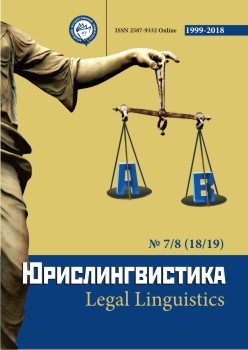ON ANTI-CORRUPTION EXPERTISE, CONDUCTED BY JUSTICE INSTITUTIONS (ON THE EXAMPLE OF ALTAI KRAI): TOPICAL PRACTITIONER ISSUES
Abstract
The article discusses topical issues of conducting anti-corruption expertise of normative legal acts and their drafts on the example of the Office of the Ministry of Justice of the Russian Federation for Altai Krai. Since 2009, the Office of the Ministry of Justice of Russia for Altai Krai has been an active subject of anti-corruption expertise in relation to regulatory legal acts (their drafts) of public authorities of the Altai Territory. The anti-corruption expertise carried out by the Department of the Ministry of Justice of Russia for Altai Krai is aimed at identifying and eliminating corruption-instigating factors that occur in regulatory legal acts (their drafts). In accordance with Federal Law No. 172-FZ of July 17, 2009, «On Anti-Corruption Examination of Regulatory Legal Acts and Draft Normative Legal Acts», the federal executive authority in the field of justice refers to entities whose duties include carrying out anti-corruption expertise along with prosecutorial authorities and law-making bodies of state power and local self-government. The results of the anti-corruption expertise carried out by the Department of the Ministry of Justice of Russia for Altai Krai are non-regulatory for the legislative bodies of Altai Krai. The analysis of the activity of the Office for Anti-Corruption Expertise within the period from 2015 to 2017 inclusive allowed us to identify the most common corruption-related factors encountered in normative legal acts of Altai Krai governmental bodies, to update the problems in the work of the Office when identifying corruption-related factors caused by imperfection of federal legislation, first of all, and also to offer ways of their tackling.
Downloads
Metrics
References
Казанцева О. Л. Антикоррупционная экспертиза нормативных правовых актов и их проектов: правовая основа и субъекты. Актуальные вопросы противодействия коррупционным правонарушениям: теория и практика. Караганда, 2014. С. 36–40.
Кочура В. Н. Антикоррупционная экспертиза: методика проведения. Журнал российского права. 2012. № 9 (189). С. 65–70.
Мещерякова С .Н., Моисеева А. А. Современные проблемы правил и методики проведения антикоррупционной экспертизы. Ростовский научный журнал. 2017. № 5. С. 53–59.
REFERENCES
Kazanceva O. L. Anti-corruption expertise of normative legal acts and their projects: legal basis and subjects [Antikorrupcionnaja jekspertiza normativnyh pravovyh aktov i ih proektov: pravovaja osnova i sub#ekty]. Topical issues of combating corruption offenses: theory and practice. Karaganda, 2014. Pp. 36–40.
Kochura V. N. Anti-corruption expertise: methodology [Antikorruptsionnaya ekspertiza: metodika provedeniya]. Journal of Russian law. 2012. № 9 (189). Pp. 65–70.
Meshcheryakova S. N., Moiseyeva A. A. Modern problems of the rules and methods of anti-corruption expertise [Sovremennyye problemy pravil i metodiki provedeniya antikorruptsionnoy ekspertizy]. Rostov scientific journal. 2017. № 5. Pp. 53–59.
Copyright (c) 2018 Юрислингвистика

This work is licensed under a Creative Commons Attribution 4.0 International License.
The authors, which are published in this journal, agree to the following conditions:
1. Authors retain the copyright to the work and transfer to the journal the right of the first publication along with the work, at the same time licensing it under the terms of the Creative Commons Attribution License, which allows others to distribute this work with the obligatory indication of the authorship of this work and a link to the original publication in this journal .
2. The authors retain the right to enter into separate, additional contractual agreements for the non-exclusive distribution of the version of the work published by this journal (for example, to place it in the university depository or to publish it in a book), with reference to the original publication in this journal.
3. Authors are allowed to post their work on the Internet (for example, in a university repository or on their personal website) before and during the review process of this journal, as this may lead to a productive discussion, as well as more links to this published work (See The Effect of Open Access).










